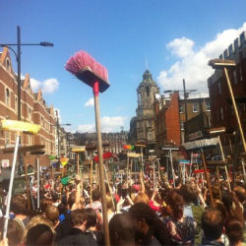The recent riots have done more to illustrate the concept of Big Society than the government has achieved since the last election, says Robert Ashton.
The ravaging hordes of lawless youngsters, pillaging, torching and hurling bricks have given us all an alarming insight into the mindset of the disaffected. We all realise, with some discomfort, that if the rioting escalates, there is actually little the police or army can do to prevent it. The veneer of civilisation is far more fragile than any of us care to admit.
As Camila Batmanghelidjh wrote in the Independent the other day: "Many of us have been concerned about large groups of young adults creating their own parallel antisocial communities with different rules. The individual is responsible for their own survival because the established community is perceived to provide nothing."
I guess you could call this parallel world ‘small society’ because it is local, territorial and exclusive.
In the Guardian recently, I compared Big Society to the turbulence of puberty, with outbreaks of spots and hot teenage anger. I wrote this before the riots and am not surprised they’ve taken place. It’s little different to those adolescent attacks on parental authority that manifest themselves as wild parties and broken windows. It’s also a sign that our society is waking up to the reality of tomorrow’s world.
I call our future the ‘Big Reality’. We know we cannot continue to spend money we don’t have, to consume material resources that are fast depleting or abdicate our individual responsibilities as citizens to inefficient, bureaucratic and at times heartless social care provision.
Remember the story a few weeks ago about the aged ballerina, now left in nappies at night because it’s cheaper than helping her out of bed and on to the toilet? She actually went to Court to force her local authority to provide night time care and lost.
In fact we can no longer afford to leave it to others to do our dirty work. We have to lean to care for our own elderly, to take an interest in our neighbourhood and those with whom we share it. We have to encourage the young to listen to the old, to appreciate a past they would find unbearable and see that whilst not perfect, their world today is pretty much OK.
It’s been proven countless times, that when people start to connect, understand each other and take a pride in their surroundings, mental health improves and health and social care costs fall. I guess Cameron would feel it insensitive to leap up and cheer when people took to the streets with shovels and brooms. Neighbours perhaps meeting for the first time, as they strive to repair the damage left by the previous night’s riots. But isn’t this exactly the concept of true, selfless volunteering he’s been talking about for months?
Let’s hope they don’t stop working together when the mess has been cleared up. There’s lots more they can do. New community organisations can emerge from the wreckage, public buildings transferred to community ownership and most importantly of all, the disengaged and disaffected gradually encouraged back into society.
The riots mark a turning point in our journey. We’re growing up, moving on from the turbulence of Big Society and rising to the challenge of our Big Reality opportunity.









